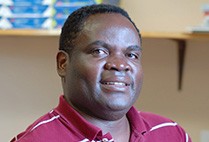Ode to the Old Myles
“They paved paradise and put up a parking lot.”
I just finished the article detailing the “gutting” of Myles (“Renovation for Myles,” Summer 2016). It actually hurt to read it.
I arrived as a freshman in 1964 and was assigned to room at Myles Standish Hall. It was not the newest dorm by any stretch. It had real character. It was a palace. It had history. It was referred to in the play Death of a Salesman.
I learned the finer points of the game of pool in the rec room as I lost more than a couple of bucks to the house hustler, “Bridgeport Bill.” I watched the original Batman weekly series in the TV room with 50 to 60 of my “closest friends” cheering, booing, and throwing stuff at the screen, but only at the appropriate time. I was right there when the first episodes of some new sci-fi series called Star Trek came on. Played four-wall handball on the court in the basement. Participated in the well-choreographed food fight graphically covered by the Record American the next day—we had invited them to witness our version of social protest over the quality of the menu. Helped paint the bed sheet banner with several of my dorm-mates that we hung in the end balcony of the old Boston Garden before we beat Harvard in the Beanpot final our sophomore year. Took a girl from Charlesgate on one of our first dates to the basement film room to see a full-length flick preceded by a couple of serial episodes of Rocket Man. I guess she was impressed—we have been married for almost 48 years. Got to see Barry and the Remains in that same venue while they jammed “Dirty Water” (“down by the river, down by the banks of the river Charles”). Had Sunday dinner from Filthy’s right across the street. Got a haircut in a back room of the same establishment. Saw the building completely dark from Kenmore Square the night of the blackout of 1965.
I spent three years there and in spite of, or more likely because of, all the above, managed to graduate.
I loved the “old” Myles. I will miss it.
Lloyd Gordon (Questrom’69,’71)
Wheatley Heights, N.Y.
I am a 1966 graduate of the College of Communication and spent my freshman year in Myles Standish Hall. The summer issue of Bostonia suggests that “Joan Baez lived there for her entire BU career.” At the time the dormitory was men only, and I believe Joan Baez was already busy singing in coffee shops. Hard to believe this statement is correct.
Bill Downey (COM’66)
Chicago, Ill.
Editor’s note: You are correct. Joan Baez lived off campus with her parents. We regret the error.
Words Create a Reality
I was so depressed after reading “Unpredictable” (Summer 2016). If Michaela Watkins and her crew were men, this story would not be allowed in print. The hostility and blatant antimale vibe are prejudices and quite intolerant. It is unbelievable that the University would condone, given the state of our culture these days, such negativity against half of humankind, the half that is fast becoming truly “marginalized.”
This spotlight in the magazine contributes to Watkins-as-role-model for many women—especially young ones—who are as confused as men these days about what to do and who they are. (For all the “freedom” and “choice,” we are a society of unhappy, unstable, and medicated people. As a counseling psychologist, I can tell you firsthand about this.)
Soloway’s “shooting from her [vagina]” disgusted me. For a man, to be made to refer to his own “organ” as other than what it is, is to convey that he is not respected for his gender, which is what he is. Though everyone is probably laughing while doing this on set, the fact is that words are not just words—they create a reality.
If this is what “new feminism” looks like, I’m going to put on a corset and start walking two steps behind my husband.
Gayle Wencis
Atkinson, N.H.
Lessons for the West
The article by Caleb Daniloff regarding Matthew Trevithick’s 41 days of captivity in Iran (“41 Days,” Summer 2016) was very interesting to me. Since I spent several years as part of a team living in Iran and building a new manufacturing facility, I have some distinct memories of the country and the people. It’s not accurate to generalize about either since the cities and the citizens are so diverse. Isfahan is quite different from Qom or Karaj. Tehran is very different from the cities near the Caspian Sea.
The people always impressed me as industrious and intelligent and it would be unfair to characterize the country based on the experiences of Trevithick. Certainly there is an element who have become as brutal and thuggish as possible. No doubt it was a horrible experience.
It would be unfair to judge most of the country by the actions of a few. Perhaps if there is a lesson in this, it would be that the Western world needs to, through the consequences of imposing regime, change in other parts of the world. The misguided attempts by Pollyannaish politicians has rarely produced a better result. Perhaps the sociologists would learn a lot if they lived with the results of their mistakes.
Bill Faris (Questrom’68)
Norman, Okla.
Dismayed at BU Theatre Sale
As a 1973 theater design graduate of the College of Fine Arts, I was disheartened to hear of the sale of the BU Theatre (“Plans Unveiled for New Theater Facility,” Summer 2016), but even more concerned that the new facility would only have a black box theater. Aside from the wonderful faculty, the BU Theatre was one of the best features of the program. When I worked in NYC, I felt at home in the Broadway houses because 95 percent of them are like the theater we had in school. I understand the economics and the location issue, but I can’t help thinking that from a training perspective, not including a proscenium theater is a major omission. There are many lessons to be learned by directors, performers, and designers in a proscenium theater that are not learned in a black box. “Leasing space in suitable venues” is not always a viable option, and I think is a step backward and a deficiency in a school with a major professional reputation.
Fred J. Hancock (CFA’73)
Oak Bluffs, Mass.
Public Health in Good Hands
The future of public health is in good hands if SPH Dean Sandro Galea is recognized as a national resource for the education, policy, and practice of public health in the United States and around the world (“The Other End of the River,” Summer 2016).
Public health, in my opinion, includes everything the article touched upon and more. Academic or occupational areas such as preventive medicine and environmental health are part of public health. I have spent a career in public health: 21 years in the US Army Veterinary Corps (now part of the Army Public Health Command) and later as an environmental health technician.
While public health is preventive in many aspects, it is also reactive. About a decade ago when there were floods in southern Minnesota, the environmental health slogan was, “We are not first responders—we are next!”
Don’t be surprised if Dean Galea gets a call to go to Washington to be a leader in public health issues on the national stage.
John H. Christy (SED’77)
Sparta, Wisc.
As always, I enjoyed the last issue of Bostonia, sent to me here in the UK. I share my copy with many here (who are not BU graduates). The articles and features have universal appeal—thank you so much for sending it to me.
May I respectfully inquire why there was no final update in the feature on Sandro Galea about what his wife, Margaret Kruk, is now doing? As her good works were initially mentioned, I expected to hear of her current activities.
Nancie Godwin (SED’60)
Stratford-upon-Avon, United Kingdom
Editor’s note: As the article states, Margaret Kruk is a Harvard T. H. Chan School of Public Health associate professor of global health.













































Related Stories
Myles Face-lift, Part One
BU’s oldest dorm is becoming its newest dorm
“The King of All Things Are Possible”
Under Petosa, a conservatory that’s also a theater company
BU Theatre, Adjoining Buildings Sell for $25 Million
Money will support new facilities on Charles River Campus
Post Your Comment